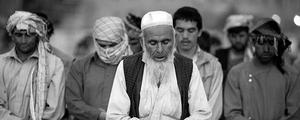This article is part of a series of U.S. Foreign Policy Opinion Briefings aimed at helping to inform U.S. leaders on pressing foreign policy issues.
Quick Summary: Iraqis' satisfaction with their living standards dropped considerably in 2011. About one-third (32%) of those outside the autonomous Kurdistan region are satisfied, down from half (50%) in October 2010. Sectarian conflict among Iraq's top political leaders is further jeopardizing the country's tenuous stability, particularly since many Sunni Muslims have lost faith in the national government and judicial system.
Issue at Hand: The outlook for many Iraqis remains bleak following the final withdrawal of U.S. troops last December. Widespread joblessness and weak infrastructure are fueling public discontent, even as Iraqi leaders engage in sectarian political power struggles.
Political crises, along with a wave of recent bombings attributed to the Iraqi branch of al-Qaeda, are raising concerns about a possible return to full-scale sectarian violence. Prime Minister Nouri al-Maliki's Shiite-controlled government arrested in October 2011 more than 600 former members of the Sunni-dominated Baath Party after a receiving a tip that some former Baathists were plotting a coup. The government also ordered the arrest of the country's Sunni vice president, Tariq al-Hashimi, accusing him of organizing a death squad targeting government officials.
Obama Administration's Stance: With the complete withdrawal of U.S. forces from Iraq, the Obama administration has lost a great deal of its influence over the situation there. U.S. diplomats say the Maliki government is obstructing their mission, often by restricting access to Iraqi officials. In addition, security concerns keep U.S. personnel largely confined to their embassy.
On Feb. 7, the U.S. State Department announced it would reduce the Iraq embassy staff by as much as half. Its waning diplomatic presence, along with the Maliki administration's recent success in consolidating its political power, diminishes the United States' capacity to promote stability and responsible governance in Iraq.
Iraqis' Satisfaction With Living Conditions and Infrastructure: Iraqis rated their lives significantly worse in 2011 than in previous years and reported feeling more negative emotions. Economic hardship is undoubtedly a factor in these worsening well-being trends. Excluding residents of the more economically developed Kurdistan autonomous region, the proportion of Iraqis who said they had trouble affording food for their families in the past year doubled to 20% in September 2011 from 10% in March 2009. Conversely, Iraqis' likelihood to be satisfied with their standard of living fell dramatically in 2011; in September about one-third (32%) were satisfied, down from half (50%) in October 2010.
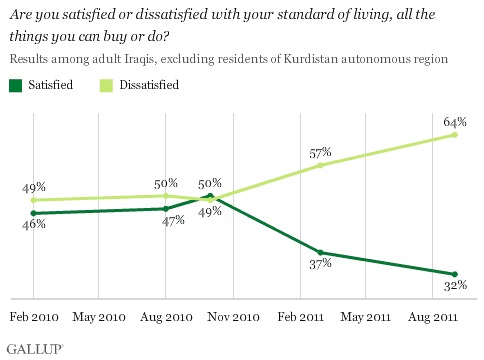
Joblessness remains a paramount concern for Iraqis. Ten percent of Iraqis overall and 8% outside Kurdistan said they are satisfied with the availability of good job opportunities in the cities or areas where they live. Iraqis' satisfaction with other aspects of their communities -- including basic infrastructure such as roads, schools, and healthcare services -- have trended downward since 2009.
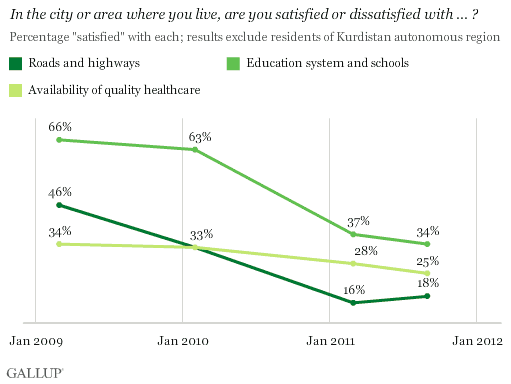
Perceptions of Key Institutions: The current Shiite-led government was seated in December 2010 after nine months of political deadlock over the 2010 parliamentary election results. In 2011, Sunnis grew increasingly distrustful of the new government, while confidence rose among Shiites. In September 2011, 57% of Shiite residents (outside Kurdistan) said they were confident in the Iraqi national government, vs. 13% of Sunnis.
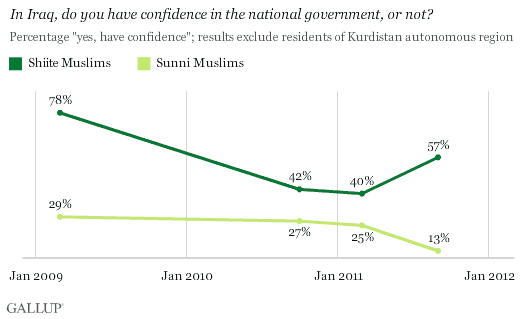
Additionally, even before the mass arrests of former Baathists last October, confidence in the country's judicial system had fallen considerably among Sunnis while comparatively stable among Shiites.
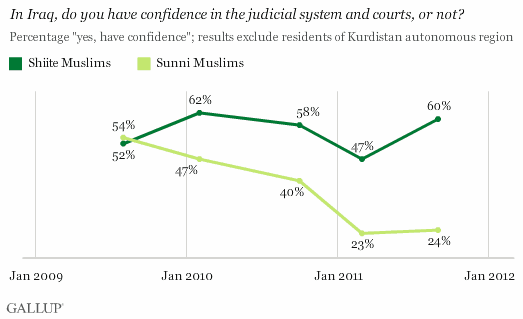
Policy Implications: The drawdown of the U.S. presence in Iraq has come at a pivotal point for the country. The Iraqi government could make strides toward a more inclusive, accountable political culture if leaders put their differences aside to focus on addressing rampant joblessness and the country's massive infrastructure deficiencies. The alternative approach could send the country into unbridled sectarianism, with leaders focused on using social divisions to enhance their own power.
Recent events suggest the latter scenario is transpiring, even as Gallup data point to rising discontent and frustration among the Iraqi public. These trends highlight the potential for return to widespread violence and instability as more and more Iraqis lose faith in the current political system. The trends also emphasize the need for the U.S. to find new ways to exert diplomatic pressure on Iraqi leaders to make progress toward more responsive democratic institutions. Unless the government can reverse current trends and rebuild public confidence, Iraq risks becoming a failed state.
For complete data sets or custom research from the more than 150 countries Gallup continually surveys, please contact SocialandEconomicAnalysis@gallup.com or call 202.715.3030.
Survey Methods
Results are based on face-to-face interviews with about 1,000 adults, aged 15 and older, conducted between June 2008 and September 2011 in Iraq. For results based on the total sample of national adults, one can say with 95% confidence that the maximum margin of sampling error is ±3.8 percentage points. The margin of error reflects the influence of data weighting. In addition to sampling error, question wording and practical difficulties in conducting surveys can introduce error or bias into the findings of public opinion polls.
For more complete methodology and specific survey dates, please review Gallup's Country Data Set details.

